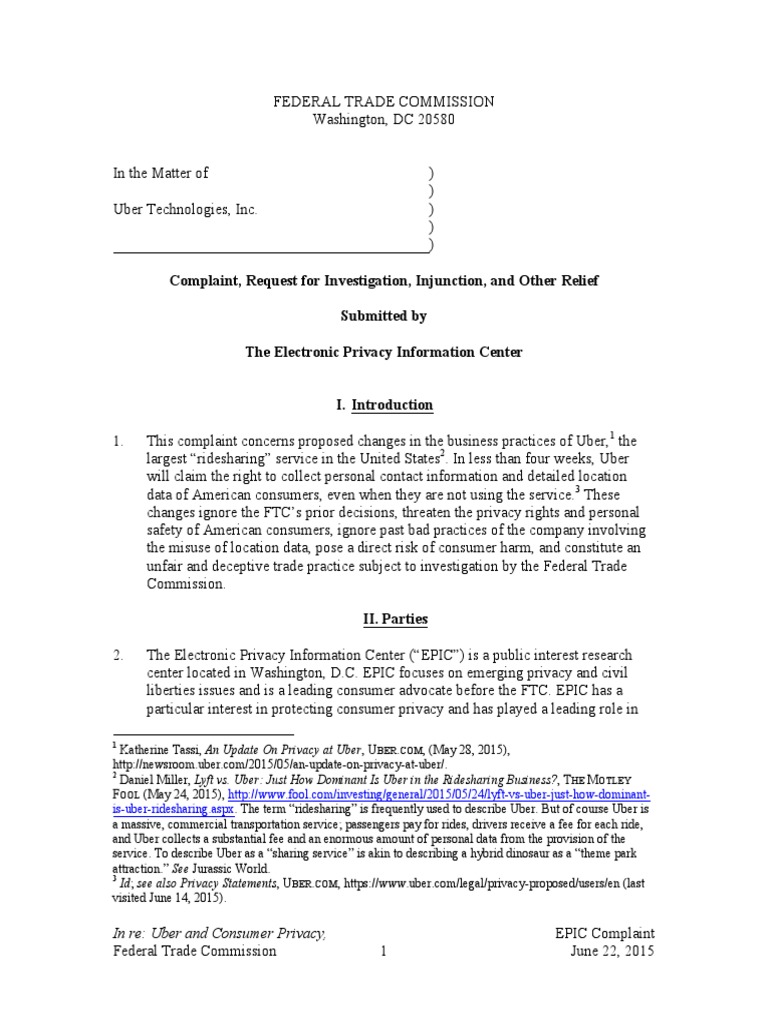Uber Faces FTC Lawsuit For Misleading Subscription Sign-Ups

Table of Contents
Uber, the ride-hailing giant, is facing a significant legal challenge from the Federal Trade Commission (FTC). The FTC alleges Uber engaged in deceptive marketing practices related to its subscription programs, specifically misleading consumers about the terms and benefits. This article delves into the details of the lawsuit, its potential impact on Uber, and the implications for riders who subscribed to Uber's services. This is a major development for consumers who rely on Uber's ride-sharing and delivery services, and understanding the implications is crucial.
FTC's Allegations Against Uber's Subscription Programs
The FTC's lawsuit centers on accusations of deceptive marketing surrounding Uber's subscription programs, primarily targeting Uber One. The complaint details several alleged deceptive practices:
- Hidden Fees: The FTC alleges that Uber obscured certain fees and charges associated with Uber One, leading consumers to believe the subscription offered greater savings than it actually did. These hidden costs, often added at checkout, contradicted the advertised pricing.
- Unclear Pricing: The lawsuit claims that Uber's marketing materials presented pricing information in a confusing and misleading manner, making it difficult for consumers to understand the true cost of the subscription and the value they would receive.
- False Advertising of Discounts: The FTC alleges that Uber falsely advertised discounts and benefits associated with Uber One, exaggerating the savings and failing to accurately represent the terms and conditions.
- Misleading Promotional Materials: The complaint likely includes examples of misleading marketing materials such as advertisements, website copy, and app notifications that were used to attract subscribers.
The FTC's case rests on violations of the FTC Act, which prohibits unfair or deceptive acts or practices in commerce. The specific sections of the Act cited will likely be detailed in the official FTC complaint. The outcome of this lawsuit could set a significant precedent for other companies offering subscription services.
Impact on Uber's Reputation and Business
This lawsuit poses a substantial threat to Uber's reputation and bottom line. The allegations of deceptive practices could severely damage consumer trust, leading to a decline in subscription sign-ups and overall ridership.
- Financial Penalties: Uber faces the possibility of significant fines and penalties if found liable. The amount could be substantial, impacting their financial performance.
- Reputational Harm: Negative media coverage and public backlash could further erode consumer confidence, impacting Uber's long-term growth and profitability.
- Stock Market Reaction: The announcement of the FTC lawsuit likely caused fluctuations in Uber's stock price, reflecting investor concerns about the potential financial and reputational ramifications.
- Legal Costs: The legal battle itself will represent a significant financial burden for Uber, adding to the overall cost of this situation.
What This Means for Uber Riders
The FTC lawsuit against Uber has direct implications for current and past subscribers of Uber's subscription services:
- Potential Refunds: Existing subscribers might be eligible for refunds or compensation if the FTC's allegations are proven. The FTC often seeks restitution for consumers harmed by deceptive business practices.
- Review Your Subscription: Riders should carefully review their Uber subscription terms and conditions to understand the details of their agreement and any potential discrepancies with Uber's marketing claims.
- Future Subscriptions: Be cautious and thoroughly investigate the terms and conditions of any subscription service before signing up. Look for hidden fees, unclear pricing, and exaggerated claims.
- Reporting Concerns: If you believe you've been misled by Uber's subscription marketing, consider reporting your concerns to the FTC.
Similar Cases and Industry Trends
Uber is not the first ride-sharing company to face legal action over misleading marketing practices. Several other companies in the industry have faced similar lawsuits, highlighting the broader issue of transparency and consumer protection within subscription models.
- Industry-Wide Concerns: The FTC lawsuit against Uber underscores a larger trend of scrutiny on subscription-based business models. Regulators are increasingly focused on ensuring fairness and transparency in these services.
- Regulatory Responses: This case could trigger stricter regulations and guidelines regarding marketing practices for subscription services within the ride-sharing and other industries.
The Future of Uber Subscriptions
The outcome of this lawsuit will significantly shape the future of Uber's subscription offerings. Uber may respond by:
- Improving Transparency: They might overhaul their marketing materials to enhance clarity and accuracy, ensuring consumers fully understand the terms and costs associated with Uber One and other subscriptions.
- Revising Pricing Structures: Uber might adjust its pricing to eliminate hidden fees and better reflect the actual value offered to subscribers.
- Strengthening Consumer Protection: They might implement internal controls to prevent future instances of misleading marketing and improve customer service to address subscriber concerns effectively.
Conclusion
The FTC's lawsuit against Uber for misleading subscription sign-ups is a significant development. The allegations of deceptive marketing practices concerning Uber One and other subscription services highlight the importance of transparency and consumer protection in the ride-sharing industry. The potential financial and reputational impact on Uber is substantial, and the outcome could influence the broader landscape of subscription-based services. Riders should carefully review their subscriptions and be aware of potential refunds or compensation. Stay informed about the progress of this lawsuit and always carefully scrutinize the terms and conditions before subscribing to any service. Avoid misleading Uber subscription sign-ups and protect yourself by thoroughly researching offers from ride-sharing services before committing. For more information on consumer protection, visit the FTC's website: [Link to FTC website].

Featured Posts
-
 Comprendre La Carte Blanche De Dominique Carlach
Apr 23, 2025
Comprendre La Carte Blanche De Dominique Carlach
Apr 23, 2025 -
 Netflix A Wall Street Safe Haven In A Turbulent Tech Landscape
Apr 23, 2025
Netflix A Wall Street Safe Haven In A Turbulent Tech Landscape
Apr 23, 2025 -
 200 Persone Protestano Contro Gli Attacchi Ai Ristoranti Palestinesi Vetrine Spaccate
Apr 23, 2025
200 Persone Protestano Contro Gli Attacchi Ai Ristoranti Palestinesi Vetrine Spaccate
Apr 23, 2025 -
 Reds All Time Low 1 0 Losses Define Unprecedented Mlb Record
Apr 23, 2025
Reds All Time Low 1 0 Losses Define Unprecedented Mlb Record
Apr 23, 2025 -
 Trumps Tariffs A Systemic Threat To The Global Financial System According To The Imf
Apr 23, 2025
Trumps Tariffs A Systemic Threat To The Global Financial System According To The Imf
Apr 23, 2025
